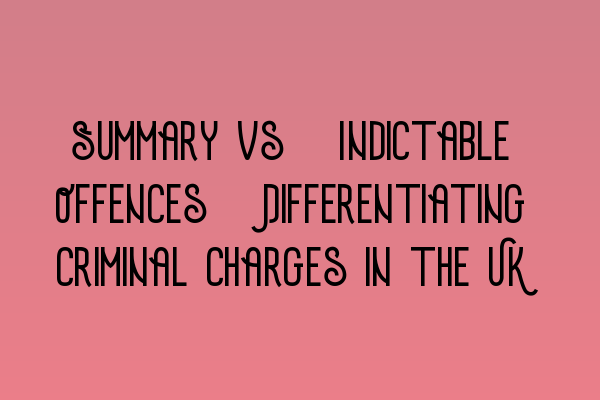Summary vs. Indictable Offences: Differentiating Criminal Charges in the UK
In the realm of criminal law, offences in the UK can be categorized into two main types: summary offences and indictable offences. Understanding the difference between the two can be crucial when it comes to defending against criminal charges or preparing a legal strategy. In this article, we will delve into the nuances of summary and indictable offences, shedding light on their distinctions and implications.
Summary Offences
Let’s first explore summary offences. These are typically less serious crimes that are heard in the Magistrates’ Court. Examples of summary offences include minor theft, public disorder offences, and driving offences like speeding or driving without insurance. Summary offences are generally dealt with swiftly, ensuring a timely resolution.
When it comes to the legal process, summary offences are relatively straightforward. The defendant is usually not entitled to a jury trial and the case is heard by a single magistrate or a panel of magistrates. The punishment for summary offences is generally limited to fines, community service, or a relatively short prison sentence.
If you find yourself faced with a summary offence charge, it is advisable to seek legal representation promptly. A qualified solicitor can guide you through the process, assessing the strength of the evidence against you and developing a robust defense strategy. Demystifying the Solicitors Qualifying Examination Format
Indictable Offences
On the other hand, indictable offences are more serious crimes that are typically heard in the Crown Court. Examples of indictable offences include murder, rape, robbery, and drug trafficking. These offences carry much harsher penalties and often involve complex legal procedures.
Unlike summary offences, indictable offences provide the defendant with the right to a trial by jury. This means that guilt or innocence is determined by a group of impartial individuals who review the evidence presented during the trial. The trial process for indictable offences tends to be lengthier and more formal, involving legal arguments and expert witnesses.
Given the severity of indictable offences, the potential consequences are far more significant. If found guilty, the defendant may face substantial fines, a lengthy prison sentence, or even life imprisonment. It is crucial for individuals facing indictable offences to seek the expertise of a solicitor with experience in criminal law. Ethical Considerations in UK Law: Upholding Professional Standards
Hybrid Offences
In addition to summary and indictable offences, it is important to mention hybrid offences, also known as “either-way” offences. These offences have characteristics of both summary and indictable offences, and the prosecution has the discretion to choose how to proceed. The decision is based on factors such as the seriousness of the offence and the defendant’s previous criminal record.
If the prosecution chooses to treat the offence as a summary offence, the case will be heard in the Magistrates’ Court. However, if the prosecution considers the offence to be more serious, it will be dealt with in the Crown Court as an indictable offence.
The flexibility of hybrid offences allows for a tailored approach based on the circumstances of each case. This means that the penalties for hybrid offences can vary significantly, depending on the route chosen by the prosecution. It is crucial to consult with a knowledgeable solicitor who can navigate the complexities of hybrid offences effectively.
Conclusion
Understanding the distinction between summary and indictable offences is essential in the field of criminal law. Whether you are facing a minor summary offence or a serious indictable offence, seeking the guidance of an experienced solicitor is crucial. They will protect your rights, analyze the evidence against you, and develop a strong defense strategy tailored to your case.
For more information on legal matters and professional services related to UK law, you may find the following articles helpful:
- LLC Formation Made Simple: Step-by-Step Guide for UK Entrepreneurs
- LLC Formation: A Step-by-Step Guide for UK Entrepreneurs
- Business Regulations in the UK: A Comprehensive Overview
For any legal assistance or inquiries, please don’t hesitate to contact us at SQE Criminal Law & Practice Law UK. We are here to assist you in your legal journey.
